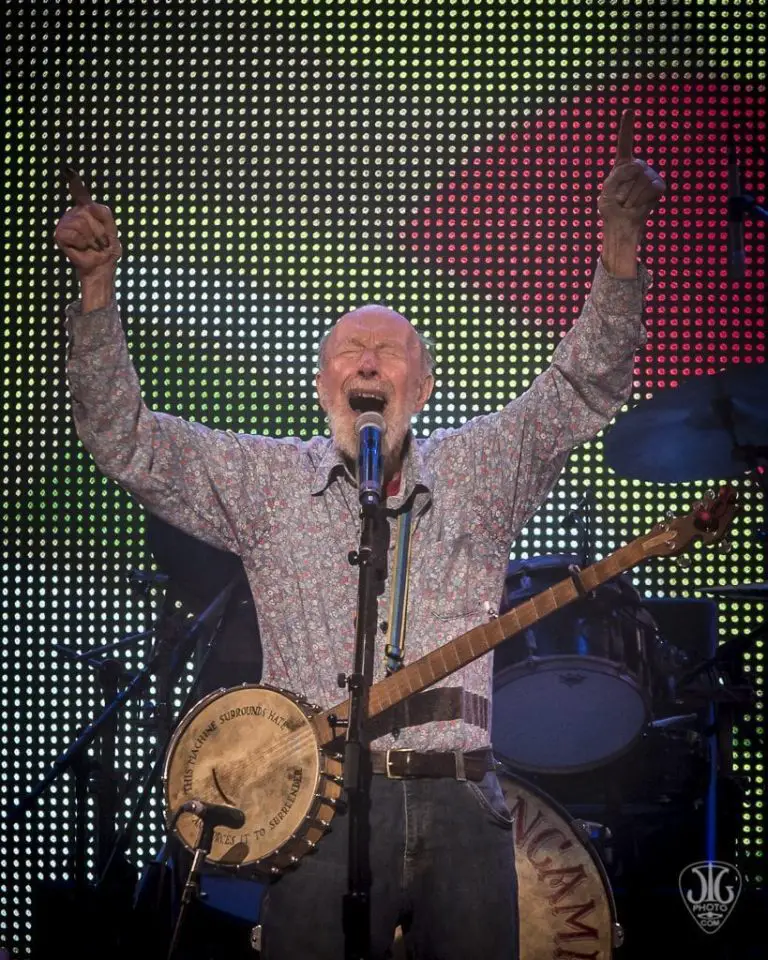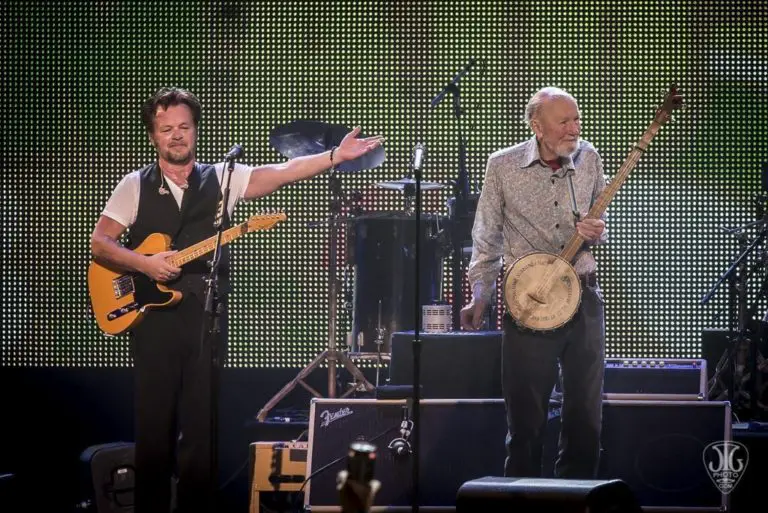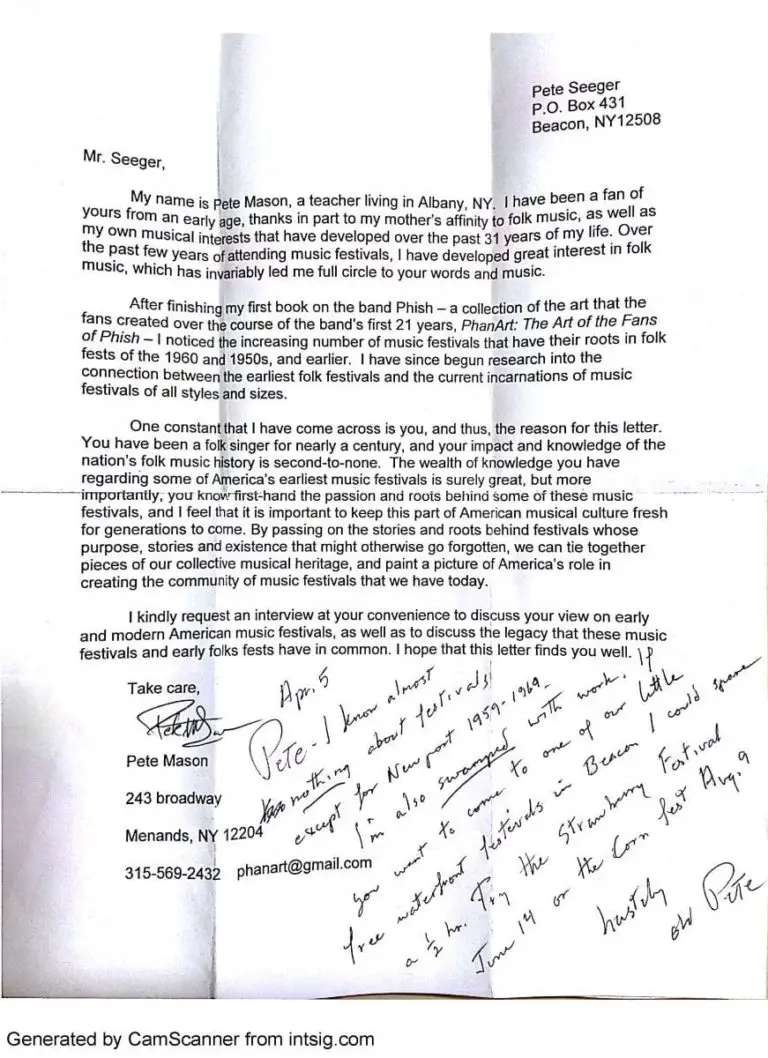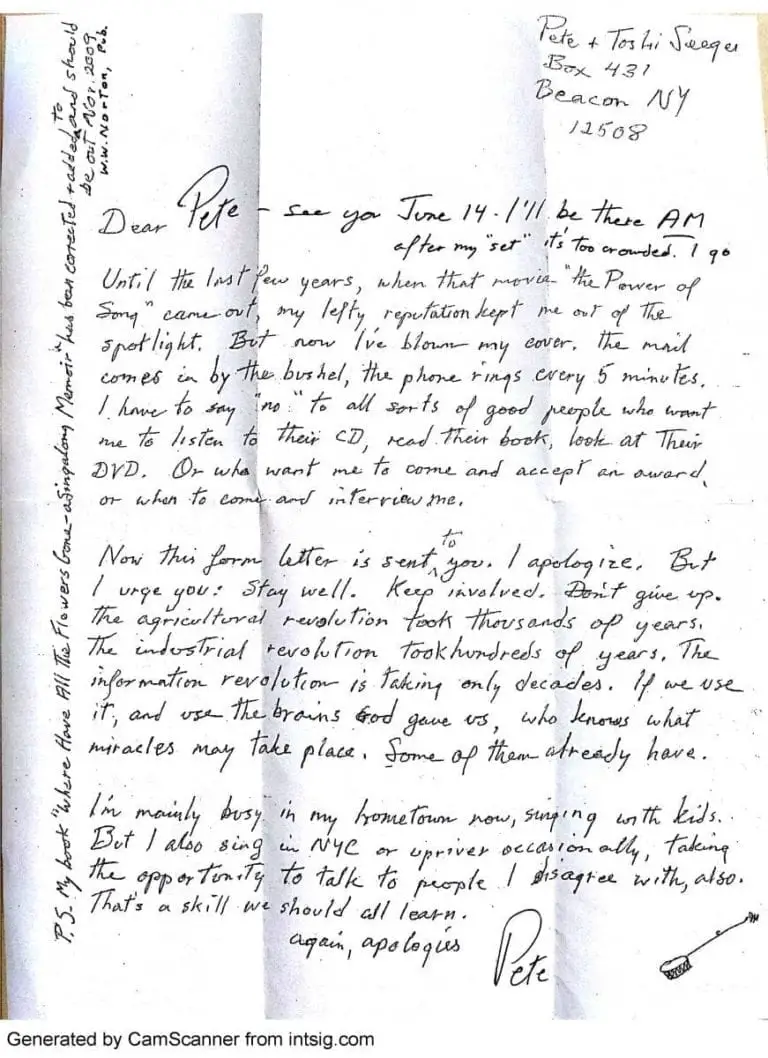Folk music legend and activist Pete Seeger died this morning at 94. An activist, teacher, singer and influence on generations of musicians, Seeger dedicated his life to music, playing a banjo that read “This machine surrounds hate and forces it to surrender”. He was pre-deceased by his wife of 60 years, Toshi Seeger.
 A lifelong resident of New York, Pete Seeger learned folk music from his father, Charles Seeger, and in turn influenced musicians from Bob Dylan to Joan Baez and Bruce Springsteen to Tom Morello. His musical impact and influence is far-reaching and encompasses songs that few identify with Seeger, for other musicians made their name with his words – Dylan, The Byrds, and Peter, Paul and Mary, to name a few. Pete Seeger spent a lifetime writing and teaching music to anyone and everyone, always with a positive outlook on the future, instilling in all the hope and courage to do the right thing and stand up for one another.
A lifelong resident of New York, Pete Seeger learned folk music from his father, Charles Seeger, and in turn influenced musicians from Bob Dylan to Joan Baez and Bruce Springsteen to Tom Morello. His musical impact and influence is far-reaching and encompasses songs that few identify with Seeger, for other musicians made their name with his words – Dylan, The Byrds, and Peter, Paul and Mary, to name a few. Pete Seeger spent a lifetime writing and teaching music to anyone and everyone, always with a positive outlook on the future, instilling in all the hope and courage to do the right thing and stand up for one another.
Even at Seeger’s 90th birthday concert on May 3, 2009 at Madison Square Garden, he was still teaching music. With a star-studded lineup to play his songs and more, Seeger talked history while teaching the audience the harmony to “Amazing Grace”, guiding the crowd through extended verses of the American original.
Agile even in his 90’s, Seeger never showed signs of retiring or slowing down, even making an appearance at Farm Aid in September 2013 at Saratoga Performing Arts Center. A surprise appearance, Seeger sang “The Hammer Song” and “This Land is Your Land”, adding in a new verse: “New York is my home, New York is your home. From the Upstate mountains to the ocean foam. With all kinds of people, yes, we’re poly-grown (sic), New York was meant to be frack free”, keeping his environmental activism at the forefront of his life. Mixing politics with music might be risky for some, but for Seeger, it was a day at the office.
His left-leaning views brought the ire of Joseph McCarthy and the House Un-American Activities Committee (HUAC) in the 1950’s, when Seeger refused to testify and answer questions on his alleged communist beliefs. Seeger did not flinch during the Red Scare, despite death threats to him and his family. What was an effort to overshadow his legacy and silence his voice were fuel to the fire that burned inside. In the decade that followed, Seeger’s songs became an anthem of the turbulent 1960’s, making him a harbinger of change. Never slowing down in his activism and music, he performed well into his 94th year.
 In 2009, as I began work on a book on music festivals I made a list of musicians I wanted to seek out for their input on the oral history of festivals that were not part of historical records. I sought out Seeger, feeling he must have a trove of stories on past events and festivals that took place in the middle of the 20th Century. Upon discovering his mailing address, I wrote him the letter below. To my surprise, he replied! He wrote back,
In 2009, as I began work on a book on music festivals I made a list of musicians I wanted to seek out for their input on the oral history of festivals that were not part of historical records. I sought out Seeger, feeling he must have a trove of stories on past events and festivals that took place in the middle of the 20th Century. Upon discovering his mailing address, I wrote him the letter below. To my surprise, he replied! He wrote back,
“Pete – I know almost nothing about festivals except Newport 1959-1969. I’m also swamped with work. If you want to come to one of our little free waterfront festivals in Beacon I could spare a 1/2 hour. Try the Strawberry Festival June 14 or the Corn Fest August 9th. Hastily, old Pete”

Undeterred and excited to have a conversation started with Seeger, I wrote back and told him I would see him at the Strawberry Festival (you will never eat better Strawberry Shortcake). This time, he sent his form letter with a note “Pete – see you June 14. I’ll be there AM. After my “set” it’s too crowded. I go.”

His reply, while reassuring and led to a walking interview, isn’t what drew me in. It’s not every day you correspond with an historic musician. It was the middle paragraph where he encourages involvement and activism, quite convincingly.
“I urge you: Stay well. Keep involved. Don’t give up. The agricultral revolution took thousands of years. The industrial revolution took hundreds of years. The information revolution is taking only decades. If we use it, and the brains God gave us, who knows what miracles may take place. Some of them already have.”
Seeger’s legacy will live on for generations, through music, through the Clearwater, through activism and protest, and above all, through hope for a better tomorrow.
“People ask, is there one word that you have more faith in that any other word, and I’d say it’s participation. I feel that this takes on so many meanings. The composer John Philip Sousa said ‘What will happen to the America voice now that the phonograph has been invented? Women used to sing lullabies to their children.’ It’s been my life’s work, to get participation, whether it’s a union song, or a peace song, civil rights, or a woman’s movement or gay liberation. When you sing, you feel a kind of strength; you think, I’m not alone, there’s a whole bunch of us who feel this way. I’m just one person, but it’s almost my religion now to persuade people that even if it’s only you and three others, do something. You and one another, do something. If it’s only you, and you do a good job as a songwriter, people will sing it.” – excerpt from the well-written narrative of Seeger’s life, The Protest Singer (Wilkinson 2009), including his testimony before HUAC and how his father’s music shaped his life. A must read.


Comments are closed.